Chess King Gukesh: How an 18-Year-Old Indian Dreamer Checkmated the World
SPORTS, 23 Dec 2024
S. Sujatha | RT - TRANSCEND Media Service
Gukesh Dommaraju is one of the six Indians in the world’s top 26 chess players, all of whom are from Grandmaster Vishwanathan Anand’s ecosystem that is popularizing the game.
19 Dec 2024 – What dreams can an eight-year-old boy harbor? Perhaps a new video game, a favorite toy, or a cherished destination. At most, an autograph or selfie with a beloved sports star. But young Gukesh Dommaraju’s dream was extraordinary: to become world chess champion.
Inspired by the legendary exploits of former champ and (arguably) the greatest Indian chess player of all time, Viswanathan ‘Vishy’ Anand, Gukesh’s imagination ignited. He envisioned himself sitting at the same hallowed table, battling the best.
“The 2013 World Championship match between then world champion Anand Sir and challenger Magnus (Carlsen) happened in my hometown Chennai,” Gukesh told RT, exclusively. “My dad took me to the match and I was overawed seeing the atmosphere and the respect and support crowd had for Anand Sir. I felt bad that he lost and felt I should somehow bring the title back home. That desire kept increasing with time.”
From that glass room, where ‘Anand Sir’ competed, Gukesh’s dream reached fruition on December 12, 2024 in Singapore, when he became the youngest world chess champion.
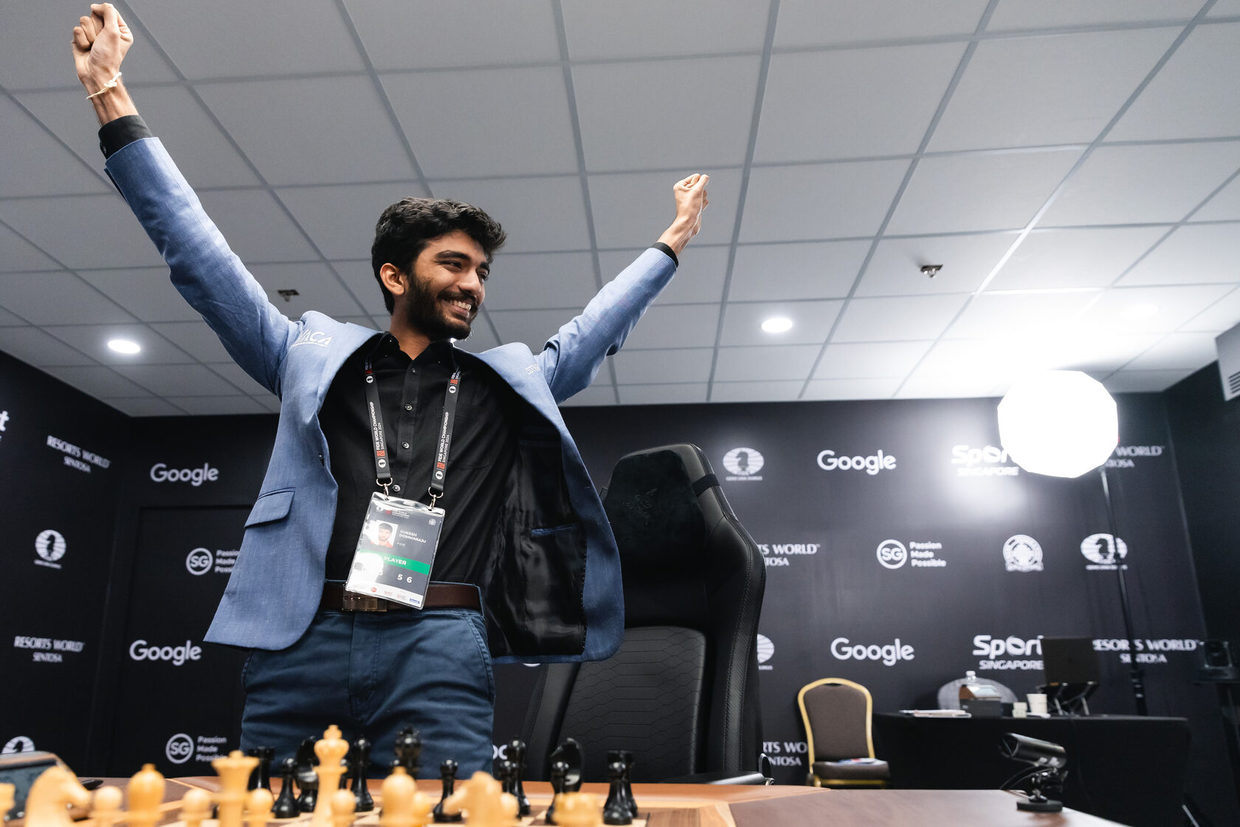
The summit: Making mom happy
Gukesh’s rapid progress and innate talent led him to become a grandmaster at the tender age of 12, a feat few have accomplished. When Gukesh became world chess champion, he surpassed the record previously set by Garry Kasparov, who won his first title in 1985 at the age of 22, beating fellow Russian Anatoly Karpov.
Incidentally, the first person to share his happiness over Gukesh’s historic feat was none other than Kasparov, who said on social media: “He has summited the highest peak of all: making his mother happy”.
For this, Gukesh had to defeat China’s Ding Liren in Singapore. After 13 of the match’s 14 rounds, both players were tied on 6.5 points, it was a solitary blunder by Ding in the 55th move of the final game that propelled Gukesh to the championship. Ding’s mistake was criticized by many, including Magnus Carlsen, the world champion. “It wasn’t really a world championship match,” Carlsen commented. “It felt more like the third round of an open tournament.”
But it was Kasparov who came to Gukesh’s defense: “The level of play was quite high, at least equal to the previous match,” he posted. “Ding showed great resistance. As for the blunders, which world championship, or world champion, was without them? I had my share and recall the double blunder in Carlsen-Anand 2014, g6. Matches take a toll.”
But it was not just the 55th move that made Gukesh world champion. Years of hard work and family sacrifice helped him achieve this feat. Gukesh played a pivotal role in his team’s bronze medal win at the World Chess Olympiad in Chennai in 2022.
He further showcased his talent by clinching gold at the 45th Chess Olympiad in Budapest. Subsequently, he qualified for the World Championship by winning the Candidates Tournament in 2023. Behind Gukesh’s success lies not only his hard work but also the unwavering support of his parents and his mentor, Viswanathan Anand.
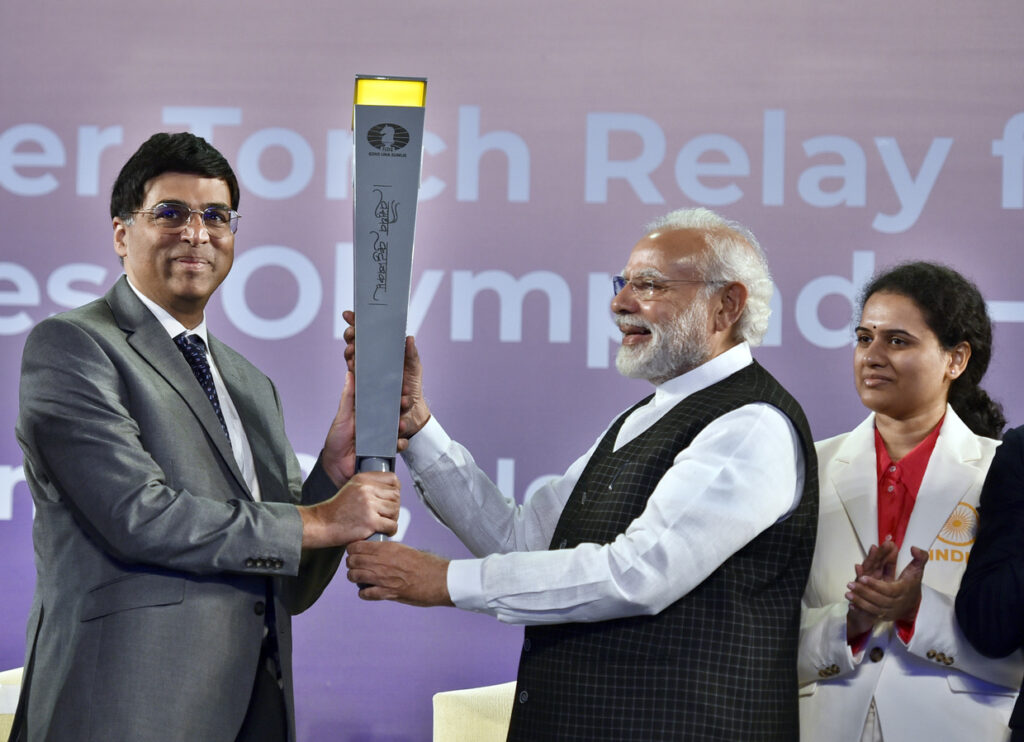
Prime Minister Narendra Modi hands over the torch to Indian chess grandmaster Viswanathan Anand during the launch of torch relay for the 44th Chess Olympiad at Indira Gandhi Stadium, on June 19, 2022 in New Delhi, India. Indian chess player Koneru Humpy is also seenseen.
© Sanjeev Verma/Hindustan Times via Getty Images
The sacrifice of medical professionals
Interestingly, neither Gukesh’s family nor his relatives had any prior experience or interest in chess. It was during school that Gukesh independently developed a passion for the game. As his parents were both working professionals, he would often find himself alone at home in the evenings. To avoid loneliness, he decided to enroll in a chess class. Gukesh’s enthusiasm and dedication impressed his coaches. As time passed, his parents, realizing their son’s passion, began providing him with the necessary support.
Gukesh’s father Rajinikanth is a doctor and his mother Padma Kumar is a professor in a medical college. When Gukesh started playing, they never imagined the time and financial commitment it would entail. However, chess eventually turned their lives upside down. Especially after Gukesh became a grandmaster at a young age, one of his parents had to constantly accompany him to tournaments.
In India, it is typically women who sacrifice their careers and aspirations for their children. Men rarely give up their careers for children’s dreams. However, Gukesh’s father was the one to quit his job six years ago.
For the past six years, Rajinikanth has dedicated all his time to Gukesh, accompanying him to training sessions, planning international tournaments, and traveling with him. The family had previously enjoyed a comfortable life on their combined income but now had to adjust to a more modest lifestyle on their mother’s income alone.
Gukesh’s mother had to work longer hours. She made significant sacrifices to fund his chess career and even dipped into their savings when they faced financial difficulty. Yet neither she nor Rajinikanth ever gave up. The couple explored every avenue to ensure Gukesh’s continued progress. His journey to success is paved with the sweat and sacrifice of his parents.
“More than me, my parents had to face a lot of struggles financially, taking risky decisions about their jobs and my education but never let me feel burdened about it,” Gukesh fondly mentioned to RT. “All I had to do was keep learning and improving my game. I can’t thank them enough. It’s their effort and dreams that guided me all the time and supported me no matter what happened.”
Controlling the board but not his emotions
When Gukesh won the championship match, he did not erupt in jubilation. Instead, his eyes welled up as he methodically rearranged the chess pieces on the board. Only then, with a quiet sense of satisfaction, did he rise from his chair and celebrate. His composure, discipline, and unwavering focus have been hallmarks of his journey.
“Since the winning moment came suddenly out of nowhere, there were a wide array of feelings like excitement and nervousness and I couldn’t keep my emotions in control as I usually manage, and I just burst into tears and sigh of relief and happiness, all at the same time,” Gukesh said.
The toughest moment in his journey?
“Probably getting the candidates’ qualification spot was the toughest emotionally, as too much expectation and pressure didn’t let me enjoy the game or the process,” Gukesh replied.
Vishy’s pivotal role
Another crucial figure behind Gukesh’s success is Indian chess legend Viswanathan Anand, who was not only responsible for igniting his Gukesh’s dream but also played a pivotal role in the journey to fulfill it.
“I met Gukesh after he became a grandmaster and he reached out to me,” Anand told RT. “I found him talented. Also we have common family friends and so this association happened over the years. Four years ago, when we started WACA (Westbridge Anand Chess Academy), he was among the first four students and from then we have interacted quite often.”
“During the world championship tournament we did not talk much. Chess is a mental game and I myself know that it needs a lot of self-absorption, so our interaction was minimal,” Anand said. “I bumped into him after he lost the first match. I shared my experience from 13 years ago when I lost the first match and then came back to win. I cheered him on, saying I lost the first and had only 11 matches but managed to win. You have 13 matches to go, you can do it, and he did come back strongly. You can see how he has grown as a player too.”
After retiring, Anand has taken it upon himself to personally identify and mentor every talented chess player in India. He provides them with all the necessary support. His contribution to Gukesh’s victory cannot be overstated.
In 2020, when the world was grappling with the crisis of the Covid-19 pandemic, Anand decided to give back to the chess world that had given him so much, he founded WACA, to nurture young chess talent.
This academy is the reason for the emergence of grandmasters such as R Praggnanandhaa and Gukesh, now considered a major force in the world of chess. They are often referred to as “Anand’s children.”
Talking about the academy Anand said:
“WACA was started to mentor young talented kids in collaboration with the Westbridge Academy. Soviet Grandmaster Mikhail Botvinnik’s ‘Botvinnik School of Chess’ was an inspiration to start this academy.” The institute is nearly 60 years old.
“India has a lot of talent but not many in the top ten,” Anand said. “So we started spotting young talent and trained them. We don’t charge anything. We give them all kinds of support, including financial support, to attend major tournaments. It made sense since we have coaches from all over the world training our players and it was not possible to bring all of them under one roof.”
About Gukesh, Anand said:
“He is a fun guy. Laughs a lot even at the smallest provocation, very good company and I’ve always enjoyed that.”
Anand added: “Through WACA, we gave him whatever support he needed, especially over the last year because the World Championship has many, many demands. Just literally whatever he asked for, we were able to do for him. Westbridge engaged Paddy Upton as his mental coach after he qualified to play the world championship. I’m happy it paid off right away.”
The challenges of a non-cricket sport
It’s important to acknowledge the challenges faced by chess players in India. Unlike cricket, which enjoys immense popularity and government support, chess often struggles to garner attention and resources. Cricketers in India are treated like gods, given lucrative contracts and endorsements. Given cricket’s popularity in India, Gukesh’s achievement is a monumental breakthrough.
Viswanathan Anand became the world 15th world matchplay chess champion in October 2008. The next Fide rating list released in January 2009 had only two Indians in the top 25 – Anand and Krishnan Sasikiran. Now there are six Indians in the top 26, including three in the top ten.
“Over the years there has been a change in the ecosystem in India,” Anand said. “After I won, many started following chess, the fan base expanded, we produced more grandmasters and they later turned into coaches and started training talented youngsters. With more players winning major tournaments we had more fans, more interest and more sponsors, and the game grew.”
Sports journalists believe that Gukesh’s triumph will spark a new wave of interest in chess in India, which will lead to the emergence of increased numbers of talented young players and significantly bolster India’s position in the global chess arena.
___________________________________________________
Tags: Chess, India, Sports
DISCLAIMER: The statements, views and opinions expressed in pieces republished here are solely those of the authors and do not necessarily represent those of TMS. In accordance with title 17 U.S.C. section 107, this material is distributed without profit to those who have expressed a prior interest in receiving the included information for research and educational purposes. TMS has no affiliation whatsoever with the originator of this article nor is TMS endorsed or sponsored by the originator. “GO TO ORIGINAL” links are provided as a convenience to our readers and allow for verification of authenticity. However, as originating pages are often updated by their originating host sites, the versions posted may not match the versions our readers view when clicking the “GO TO ORIGINAL” links. This site contains copyrighted material the use of which has not always been specifically authorized by the copyright owner. We are making such material available in our efforts to advance understanding of environmental, political, human rights, economic, democracy, scientific, and social justice issues, etc. We believe this constitutes a ‘fair use’ of any such copyrighted material as provided for in section 107 of the US Copyright Law. In accordance with Title 17 U.S.C. Section 107, the material on this site is distributed without profit to those who have expressed a prior interest in receiving the included information for research and educational purposes. For more information go to: http://www.law.cornell.edu/uscode/17/107.shtml. If you wish to use copyrighted material from this site for purposes of your own that go beyond ‘fair use’, you must obtain permission from the copyright owner.
One Response to “Chess King Gukesh: How an 18-Year-Old Indian Dreamer Checkmated the World”
Join the discussion!
We welcome debate and dissent, but personal — ad hominem — attacks (on authors, other users or any individual), abuse and defamatory language will not be tolerated. Nor will we tolerate attempts to deliberately disrupt discussions. We aim to maintain an inviting space to focus on intelligent interactions and debates.
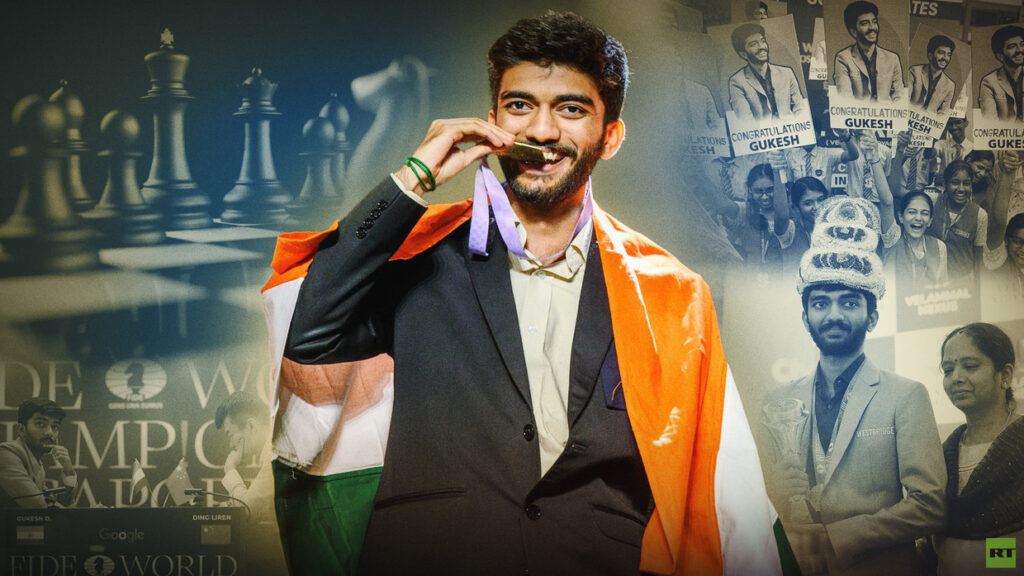
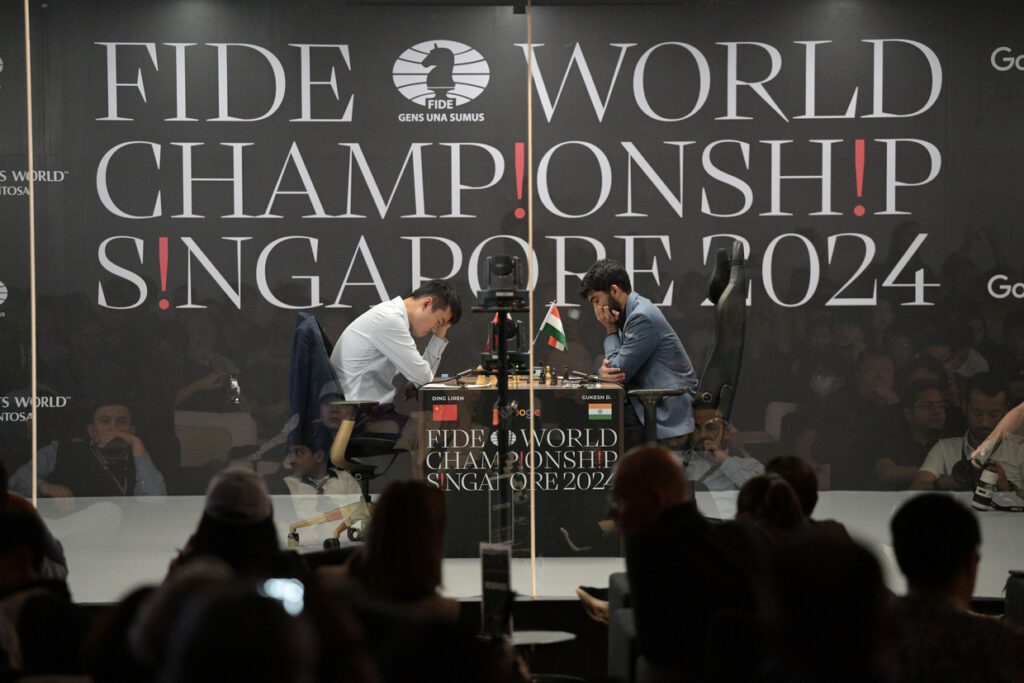


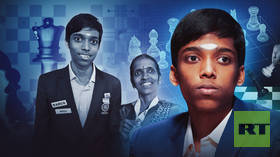
A very interesting and unusual story I knew little (nothing!) about.